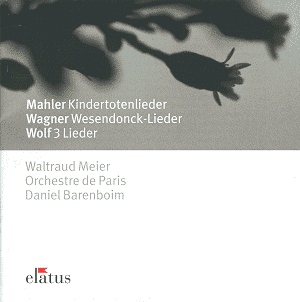The
main difference between an amateur and what we would call a "professional"
poet is not necessarily the quality of their best work, but the
fact that a "professional" writes much more poetry and
hence develops a facility which allows the treatment of very subtle
subjects and moods. Here we have song texts written by two famous
poets and by one amateur but almost equally famous poetess. I’ve
always liked Wesendonck’s "Der Engel" very much and
have been working over my English translation of it for years.
In their poetry the Germans seem to employ a simpler and perhaps
slightly archaic grammar, and hence it is easier for English speakers
to translate German poetry than it is German prose.
Mahler’s
emotions regarding his own music are often difficult to understand.
I heard that when he played through Das Lied von der Erde
the first time for an invited audience of close friends, at the
conclusion while everyone else was tearful, moved beyond speech,
Mahler jumped up from the piano and said, "Well, that should
make them want to run out and kill themselves!" Mahler wrote
Kindertotenlieder at the peak moment of his happiness with
his children and later, when they had died, he said "Perhaps
it was to tempt fate to compose the Kindertotenlieder."
The works, based on poems by Rückert, explore various different
moods related to their subject and probably would been impossible
to compose if he had been experiencing truly disabling grief.
A successful performance requires a dramatic voice with a range
of sounds and moods, in intimate partnership with an orchestra
of great variety of color, dynamics from the quietest to the very
loudest.
Daniel
Barenboim and Waltraud Meyer have not too long ago done a tremendous
video Tristan together, and not surprisingly their collaboration
in this disk, from the sense of balance and drama, is exceptional
and utterly without flaw. Unfortunately, in her low range at the
beginning of the first Mahler song, Meier has some problems finding
and keeping pitch, difficulties which are generally overcome by
the second Mahler song and thereafter, although some slight unsteadiness
is occasionally heard in quiet passages throughout; but in full
voice she is glorious!
Whether
I am being chauvinistic or not, I think Janet Baker has the perfect
catch-in-the-throat English contralto voice for this music, and
is also a magnificent actress. She sings here with Bernstein considerably
better than she did when I heard her in concert some years before
this recording was made, and better than on her EMI recording
with Barbirolli. Bernstein accompanies her very well, restraining
his usual tendency to try to pump up the musical drama with exaggerated
theatrical tempo swings; this is an excellent version overall.
The Mahler Symphony #8 included in the set is very so-so, displaying
Bernstein’s typical wayward tampering with the rhythmic pulse
of the music, making this set less attractive overall for that.
DeYoung
sings for Thomas as though she can’t hear the orchestra, or perhaps
she takes a prima donna’s attitude that what the orchestra does
is none of her concern since its only function is to accompany
her. Or she may have simply have been having a bad night; greater
voices than hers have. Whatever her motivation she is consistently
wobbly and behind the beat; however rich and mellow her sound,
and this cannot be considered a satisfactory recording. Since
she has received unreserved critical raves for everything she
has ever sung, one assumes that this recording must somehow be
an exceptional one.
Maureen
Forrester has a voice nearly as large as DeYoung’s, but she works
in intimate partnership with the orchestra, producing heart-wrenching
drama and brilliant dynamic and textural contrasts. This remains
one of my favourite versions of this music.
The
Wesendonck Lieder have been spoken of as almost a mini-Tristan
since some of the same melodic and orchestral phrases appear in
both works, and this recording is by no means the first to be
performed by a conductor and soloist who have also recorded the
larger work. Flagstad’s interpretation is exceptional, and unique,
and she recorded the work a number of times; of course these recordings
are showing their age. But if you’re a Flagstad fan, you already
have her doing these works, and the Meier version with its up
to date sonics will be a fine partner in your collection.
The
Wolf songs are settings of wonderful, strange poems by Mörike
and, unfortunately, as usual, I am bewildered and angry at the
bad translations furnished with the disk, even including a misprint
(‘Weise’ instead of Wiese). Hopefully if you buy this disk you
will have access to better texts, but it is worth the effort of
learning a little German yourself to be able to appreciate these
beautiful poems and, hence, these exquisite songs. Schwartzkopf
with piano accompaniment sings quietly, mysteriously, with hushed
drama, and Meier with the orchestra sings them operatically with
brilliant drama, so comparison is hardly possible, the works easily
allowing for both approaches.
Paul
Shoemaker


![]() Waltraud Meier, mezzo soprano
Waltraud Meier, mezzo soprano
![]() ELATUS (WARNER CLASSICS)
2564-60439-2 [56.04]
ELATUS (WARNER CLASSICS)
2564-60439-2 [56.04]